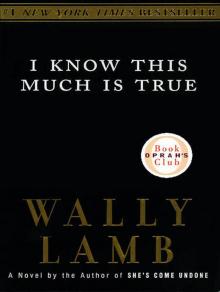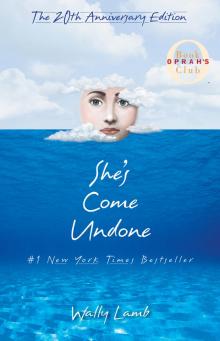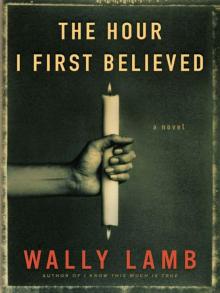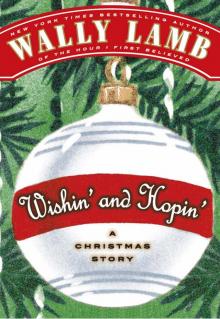- Home
- Wally Lamb
She's Come Undone Page 2
She's Come Undone Read online
Page 2
She’s Come Undone was released in July of 1992. I was sent off on a six-city book tour—heady stuff for a high school English teacher, despite the fact that the sparse bookstore crowds sometimes included four or five employees hoping to help me save face. At each stop, I heard the same comments and questions from audience members who had read Dolores’s story. I had to keep flipping back to the book jacket photo to see if you were really a guy. . . . How could a man have written so effectively from a woman’s viewpoint? Truth be told, writing in the opposite gender hadn’t seemed like such a big deal to me while the novel was in progress. I’d grown up in a neighborhood presided over by my older sisters and girl cousins, so there’d been nothing of the feminine mystique in my childhood. Moreover, I had had nine years’ worth of feedback from my writers group, the female members of which were never shy about speaking up whenever I hit false notes, which I’d done often enough. But I had revised relentlessly. Besides, although I had written in Dolores’s voice, what I had always felt was parental. Often when I picked up my Bic pen and invited my character to tell me a little more of her life story, I’d worry about the things she said, the things she did, the way the father of a not-quite-controllable daughter worries. But the consistency of those book tour questions and comments began to make me feel a little insecure—as if I’d broken some cardinal rule of which everyone but I had been aware. And so, after each reading when my escort would drop me back at my hotel, I’d take off my pants and check to make sure my male equipment was intact. Yup, still there. Relieved, I’d check my itinerary to see where my next tour stop would take me, crawl under the covers, and go to sleep.
When my tour reached California, Linda Chester’s associate editor, Laurie Fox, took me to brunch at a lovely outdoor café. “What’s that?” I said when she pulled a sheaf of legal-sized pages from her bag. Laurie said it was a book contract. The publisher wanted me to write a second novel and would pay me an advance to do so. “Isn’t that a little ass-backwards?” I said. “Taking money for work I haven’t done yet?” Laurie said that was an interesting way to look at it and poured me some more Chablis. Before brunch ended, I signed on the dotted line. By summer’s end, I had taken a leave of absence from teaching and begun my second novel, which six years later would become I Know This Much Is True, a story about identical twin brothers, one of them schizophrenic.
With Dolores and company off my desk and out in the world, reader mail began to trickle in. Telephone calls, too. When Oprah Winfrey called to tell me she had read and liked Undone—and that I owed her two nights’ sleep—I kept pointing to the phone and mouthing to my wife, “Oprah! It’s Oprah!” Chris has many talents, but lip-reading isn’t one of them. “Hope?” she guessed. “Dope? The Pope?” I received this memorable call five years before Oprah launched her phenomenally popular TV book club and telephoned again to tell me that she’d selected Undone as the third title she was recommending to her millions of viewers. But Oprah’s first call had nothing to do with her show. She had just wanted to tell me, reader to writer, that Dolores’s story had spoken to her and that she was glad I’d written it. This, for me, has always been the cherry atop the sundae of all that came later.
Twenty years, two literary agents, and four novels later, I now have several plastic tubs overflowing with reader mail, much of it about Undone. I treasure all these letters, but my very favorite remains the one I received within the first year of the book’s publication from a seriously mentally ill young man—a cutter who had repeatedly tried to relieve his pain through self-mutilation. Here’s an excerpt from that letter:
I didn’t write to bear my soul or anything, Mr. Lamb, but when I was an inpatient at the Institute of Living for two and a half years, I read a lot and thought a lot, and one of my ridiculous thoughts/fantasies was that if I were to have a literary character dinner party, I would invite, being 27 but still pathetically immature, [Salinger’s] Holden Caulfield, [Hemingway’s] Jake Barnes, [Kate Chopin’s] Edna Pontellier, and [John Updike’s] Rabbit Angstrom (the young one). What I wanted to tell you is that I’m extending an invitation to Dolores Price for that dinner party. . . . I wasn’t fat as a kid like Dolores, but when I got to the I.O.L. and they hit me with Thorazine, etc., etc., suddenly (now) I weigh a hundred pounds more than I did in college. And though I never tried to drown myself as Dolores did—I was a razor man—the scene with the [dead] whale was amazing. I felt like she was fighting for me. And when that circle bubbles up [just before her whale surfaces at the end], I felt happy for her and really lifted. Thanks for writing your book. Give my love to Dolores!
Shalom, David F.
P.S. Doesn’t it piss you off when people buy a book by Millie the Dog or Rush Limbaugh when they could be making a friend for life if they just met Dolores Price. I don’t know. Fuck ’em. I was sure it was going to be a best-seller.
David F’s letter made me laugh and cry as Dolores herself had done while I was discovering her story, and so I did a little detective work and, against all odds even in those pre-HIPAA law days, I found out his last name and got ahold of his telephone number. I called him up to thank him for his brave and amazing letter, and to tell him that I thought he, too, should pursue writing. He sounded painfully shy, shocked to have heard back from me. When I said I hoped to meet him someday, he told me apologetically that, although he would like to meet me, too, he could never handle such an encounter. That initial exchange began a letter-writing friendship that exists to this day, twenty years later.
Five years after I received David’s letter, Oprah did, of course, turn Undone into a New York Times and USA Today number one bestseller. A January 1997 Boston Globe story about the novel’s selection for Oprah’s Book Club—the first by a male writer—best depicts the whirlwind of attention in the middle of which I suddenly found myself. Above a large photo of me seated before my high school students, one shoe untied, a look of befuddlement on my face, a headline asks, incredulously, WALLY WHO?
Way back in 1981, the year I became a father and began writing fiction, I could never have predicted all that has come to pass, good and bad: 9/11 and Columbine; the rise of the ebook and the decline of the printed one; the demise of both the typewriter and its successor, the dot matrix printer; the deaths of my parents and the births of Jared’s two younger brothers, Justin and Teddy. Today, that toddler I tossed into the air upon learning that my short story was good enough to be published is the same age I was back then. Jared is now the thirty-one-year-old principal of the New Orleans Leadership Academy, a KIPP charter school he established for inner-city kids in the wake of Hurricane Katrina.
As I could not have imagined all of the above, neither could I have predicted what happened one winter evening in 2008, shortly before my third novel, The Hour I First Believed, was published. I was reading from the book in front of a large and affable crowd at the Mermaid Bar, a downtown New Haven watering hole. When I finished the Q and A and was getting ready to leave, a handsome, healthy-looking guy in his early forties came up to me and said, “Hey, Wally. It’s me. I wanted you to know that I finally took your advice. I’ve just enrolled in an MFA in writing program at Fairfield University so that I can tell my story.” Standing before me was my pen pal of the past sixteen years, David F—David Fitzpatrick. Miraculously, the right combination of therapy and psychotropic meds had allowed him to emerge, at long last, from the mental illness that had oppressed him and taken him out of the world. “I’ve met a wonderful woman,” he told me that night. “Amy and I are engaged.” Last October, Chris and I attended David and Amy’s wedding, a joyous and triumphant celebration if ever there was one. A few months after that, I read the galleys of David’s memoir about his harrowing journey into madness and his subsequent return to sanity. Harper-Collins will publish Sharp at about the same time Atria Books releases this spiffy new twentieth-anniversary edition of She’s Come Undone. I like to imagine the two sitting side by side on bookstore shelves, keeping each other company.
* * *
> I’m glad I didn’t kill off Dolores Price, as my dad had assumed I would do, and I’m grateful that the passage of time hasn’t killed her off, either. At appearances, I’m still told by readers of Undone that they had to keep looking back at my book jacket photo, and that they couldn’t believe that a man could have gotten so convincingly into the head of a woman. (Once, at a tony black-tie fund-raiser at Lincoln Center, columnist Liz Smith introduced me by saying that I had caused quite a stir by getting into the head of a woman, and that although a lot of other fellows were interested in getting into women, it wasn’t necessarily their heads they were aiming for. Try walking up to a podium after an intro like that!) The gender comments and questions no longer bother me. My soon-to-be-published fifth novel, We Are Water, is told in eight different voices, four of them male, four of them female. Who knows? If it’s true that men are from Mars and women are from Venus, then I guess I’m just lucky to be an intergalactic traveler.
Sometimes when I’m browsing at my local bookstore, I wave to my moonfaced heroine on the cover of She’s Come Undone—my fictional daughter whose story by now has been translated into sixteen or seventeen different languages. I’m grateful that she’s still out there and, for that matter, that I’m still here, too.
—Wally Lamb
Connecticut, 2012
PART ONE
Our Lady of Sorrow
1
In one of my earliest memories, my mother and I are on the front porch of our rented Carter Avenue house watching two delivery men carry our brand-new television set up the steps. I’m excited because I’ve heard about but never seen television. The men are wearing work clothes the same color as the box they’re hefting between them. Like the crabs at Fisherman’s Cove, they ascend the cement stairs sideways. Here’s the undependable part: my visual memory stubbornly insists that these men are President Eisenhower and Vice President Nixon.
Inside the house, the glass-fronted cube is uncrated and lifted high onto its pedestal. “Careful, now,” my mother says, in spite of herself; she is not the type to tell other people their business, men particularly. We stand watching as the two delivery men do things to the set. Then President Eisenhower says to me, “Okay, girlie, twist this button here.” My mother nods permission and I approach. “Like this,” he says, and I feel, simultaneously, his calloused hand on my hand and, between my fingers, the turning plastic knob, like one of the checkers in my father’s checker set. (Sometimes when my father’s voice gets too loud at my mother, I go out to the parlor and put a checker in my mouth—suck it, passing my tongue over the grooved edge.) Now, I hear and feel the machine snap on. There’s a hissing sound, voices inside the box. “Dolores, look!” my mother says. A star appears at the center of the green glass face. It grows outward and becomes two women at a kitchen table, the owners of the voices. I begin to cry. Who shrank these women? Are they alive? Real? It’s 1956; I’m four years old. This isn’t what I’ve expected. The two men and my mother smile at my fright, delight in it. Or else, they’re sympathetic and consoling. My memory of that day is, like television itself, sharp and clear but unreliable.
We hadn’t bought the set; it was a gift from Mrs. Masicotte, the rich widow who was my father’s boss. My father and Mrs. Masicotte’s relationship had started the previous spring, when she’d hired him to spray-paint several of her huge apartment houses and then wooed him into repainting his own pickup truck in her favorite color, peach, and stenciling the words “Masicotte Properties, General Manager” on the doors. The gift of the television celebrated my father’s decision.
If I reach far back, I can see my father waving to my mother and me and climbing down from his ladder, spray gun in hand, as we arrive with his lunch in our turquoise-and-white car. Daddy reaches the ground and pulls off his face mask. The noise of his chugging orange air compressor is in my throat and legs, the sudden silence when he unplugs it delicious. There are speckles of paint in his hair and ears and eyebrows, but the mask has protected the rest of his face. I look away when his clean mouth talks.
We lunch in the grass. My father eats sandwiches stuffed with smelly foods Ma and I refuse to eat: liverwurst, vinegar peppers, Limburger cheese. He drinks hot coffee right from the thermos and his Adam’s apple moves up and down when he swallows. He talks about “she” in a way that confuses me; “she” is either this half-white house of Mrs. Masicotte’s or the old woman herself.
Old. I’m almost forty, probably as close now to Mrs. Masicotte’s age as I am to the age of my parents as they sat on that lawn, laughing and blowing dandelion puffs at me, smoking their shared Pall Mall cigarettes and thinking Mrs. Masicotte was the answer to their future—that that black-and-white Emerson television set was a gift free and clear of the strings that would begin our family’s unraveling.
* * *
Television watching became my habit, my day. “Go out back and play, Dolores. You’ll burn that thing up,” my mother would warn, passing through the parlor. But my palm against the box felt warm, not hot; soothing, not dangerous like the boy across the street who threw rocks. Sometimes I turned the checker knob as far as it would go and let the volume shake my hand.
Ma always stopped her housework for our favorite program, “Queen for a Day.” We sat together on the sofa, my leg hooked around Ma’s, and listened to the women whose children were crippled by polio, whose houses had been struck by lightning and death and divorce. The one with the saddest life, the loudest applause, got to trade her troubles for a velvet cape and roses and modern appliances. I clapped along with the studio audience—longest and hardest for the women who broke down and cried in the middle of their stories. I made my hands sting for these women.
My father’s duties as Mrs. Masicotte’s manager, in addition to painting the outsides and insides of her properties, included answering tenants’ complaints and collecting their monthly rents. The latter he did on the first Saturday of every month, driving from house to house in Mrs. Masicotte’s peach-colored Cadillac. By the time I was a first grader, I was declared old enough to accompany him. My job was to ring tenants’ bells. None seemed happy to see my father and most failed to notice me at all as I peeked past them into their shadowy rooms, inhaling their cooking smells, eavesdropping on their talking TVs.
Mrs. Masicotte was a beer drinker who loved to laugh and dance; the package store was one of our regular Saturday afternoon errands. “Case o’ Rheingold, bottles,” my father would tell the clerk, an old man whose name, Cookie, struck me funny. Cookie always offered me a cellophane-wrapped butterscotch candy and, by virtue of Mrs. Masicotte’s order, a chance to vote for Miss Rheingold at the cardboard ballot box next to his cash register. (Time after time I voted for the same Rheingold girl, whose dark brown hair and red-lipped smile reminded me both of Gisele MacKenzie from “Your Hit Parade” and my own mother, the best looking of the three.)
My father was proud and protective of his own dark good looks. I remember having sometimes to hop around and hold my pee until he was finished with his long grooming behind the pink bathroom door on Carter Avenue. When he emerged, I’d stand on the stool amidst the steam and the aroma of uncapped Old Spice, watching my face wobble and drip in the medicine cabinet mirror. Daddy lifted barbells in the cellar—barefoot, wearing his undershirt and yellow bathing suit. Sometimes he’d strut around the kitchen afterward, popping his muscle at Ma or picking up the toaster to give his reflection a kiss. “You’re not conceited, you’re convinced!” Ma would joke. “Convinced you, all right, didn’t I?” he’d answer, then chase her around the kitchen, snapping the dish towel at her fanny and mine. Ma and I whooped and protested, delighted with his play.
After the television came, Daddy brought his barbells upstairs and exercised in front of his favorite programs. Quiz shows were what he liked: “The $64,000 Question,” “Tic Tac Dough,” “Winner Take All.” Sometimes in the middle of his grunting and thrusting he’d call out the answers to losing players or, if they blew their chances, swear at them. “
Well,” he’d tell my mother, “another poor bastard bites the dust, another poor slob gets to stay a working stiff like the rest of us.” He hated returning champions and rooted for their defeat. His contempt for them seemed somehow connected to his ability to lift the weights.
According to my father, we should have been rich. Money was, in his mind, somehow due us and would have been ours had his simple parents not sold their thirty acres on Fisherman’s Cove for $3,000 to a Mr. Weiss the month before drowning in the Great Hurricane of 1938. During the Depression, when my father was coming of age, Fisherman’s Cove had been just marsh grass, wild blueberry bushes, and cabins with outhouses; by the time he went to work for Mrs. Masicotte, it was the cozy residence of millionaires. These included Mr. Weiss’s son, who lived two driveways down from Mrs. Masicotte and golfed for a living.
My father forgave Mrs. Masicotte her wealth because she was generous with it—“spread it around,” as he put it. In those early years, the television was only the first in a stream of presents that included a swing set for me, kitcheny things for my mother (a set of maroon-colored juice glasses, a black ice bucket with brass claw feet), and, for my father, gifts he wore home from the big house on the cove: a houndstooth sports jacket, leather gloves lined in genuine rabbit’s fur, and my favorite—a wristwatch with a Twist-O-Flex band you could bend but not break.
“That’s it, Jewboy, add another couple thousand to your stash,” my father shouted at the TV one night, in the middle of his exercise routine. “The $64,000 Question” was on; a champion with round eyeglasses and shiny cheeks had just emerged victorious from the Revlon isolation booth.

 I Know This Much Is True
I Know This Much Is True She's Come Undone
She's Come Undone The Hour I First Believed
The Hour I First Believed I'll Take You There
I'll Take You There Wishin' and Hopin'
Wishin' and Hopin'